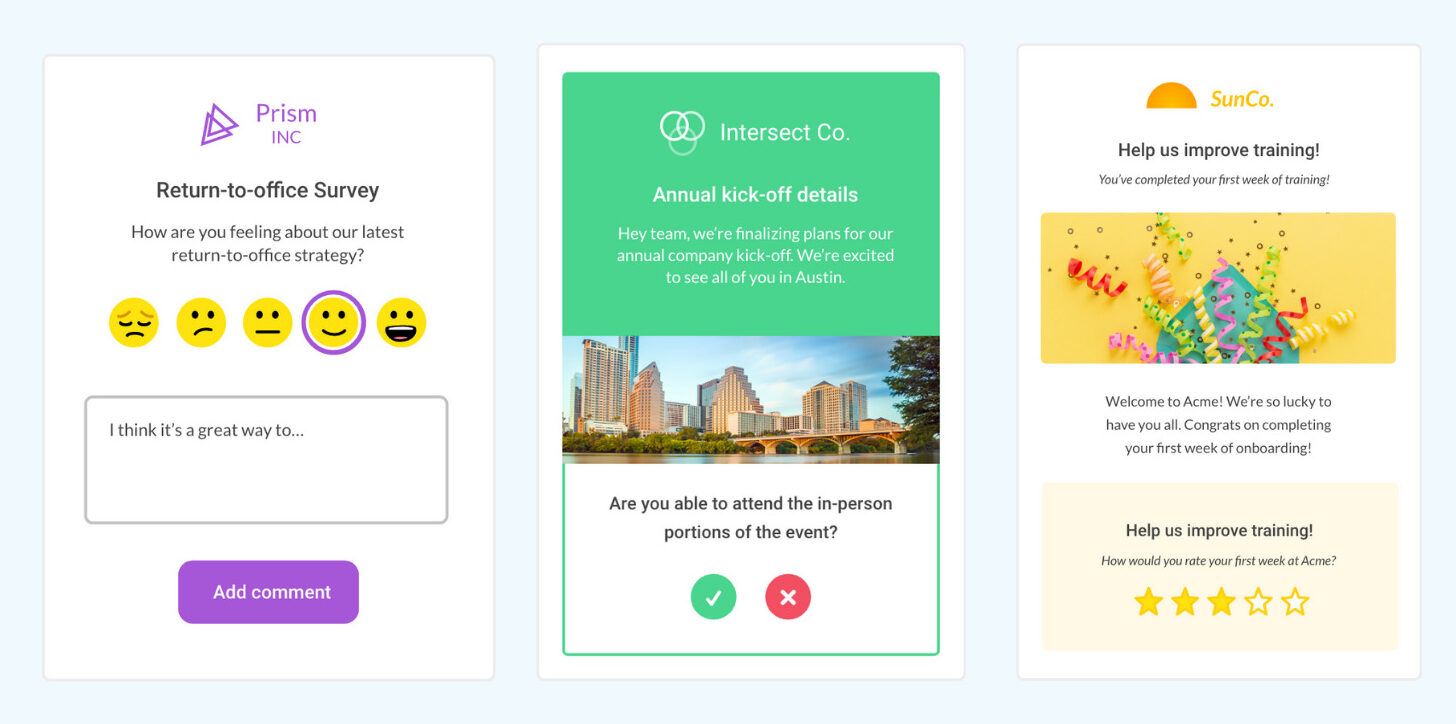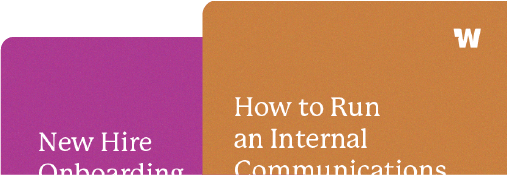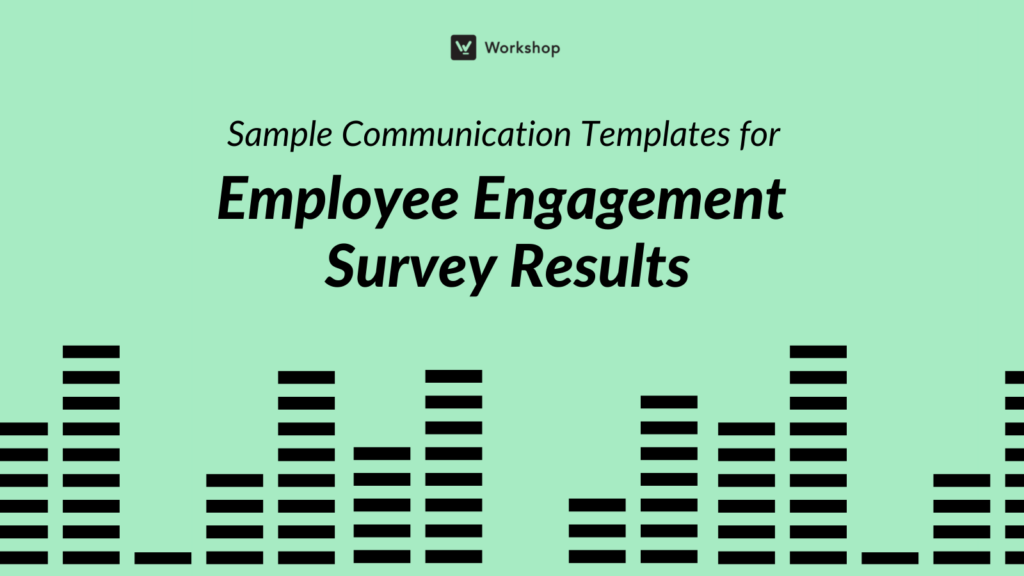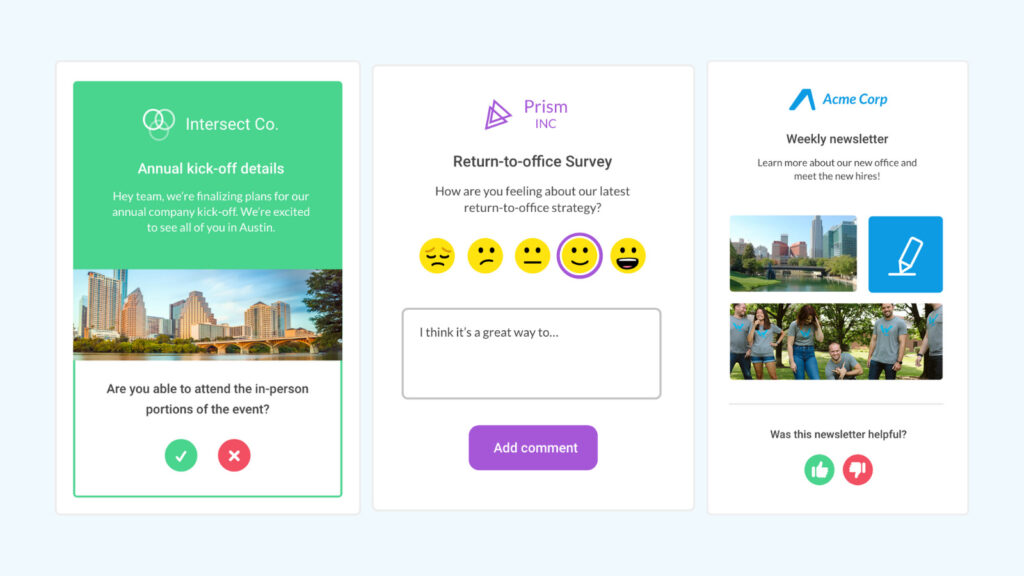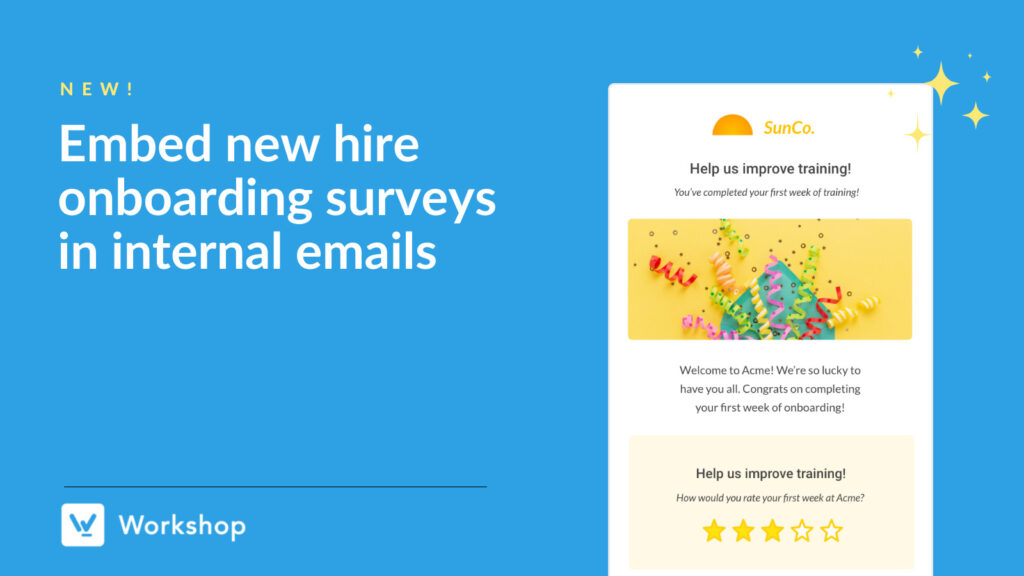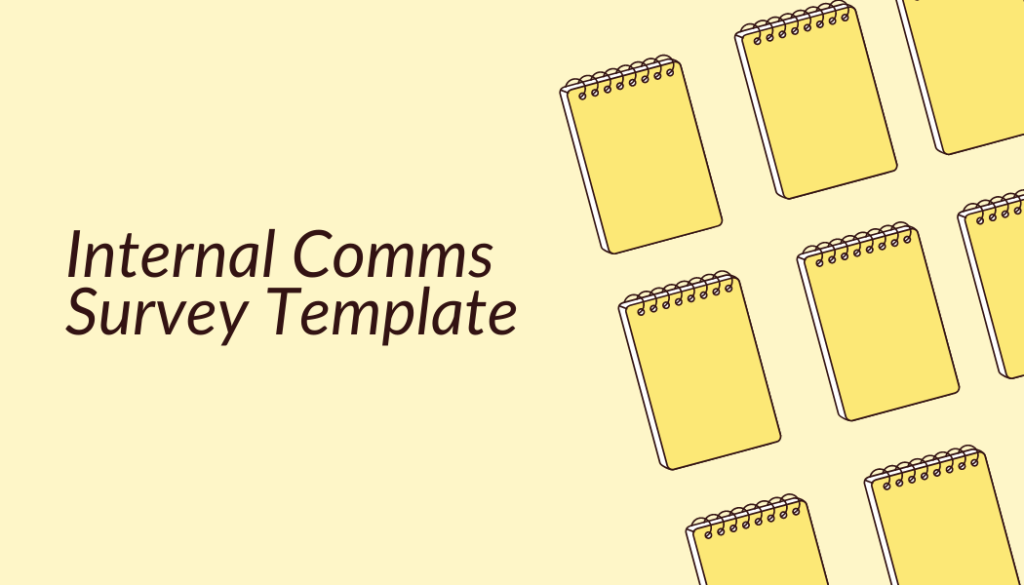275+ examples of employee survey questions
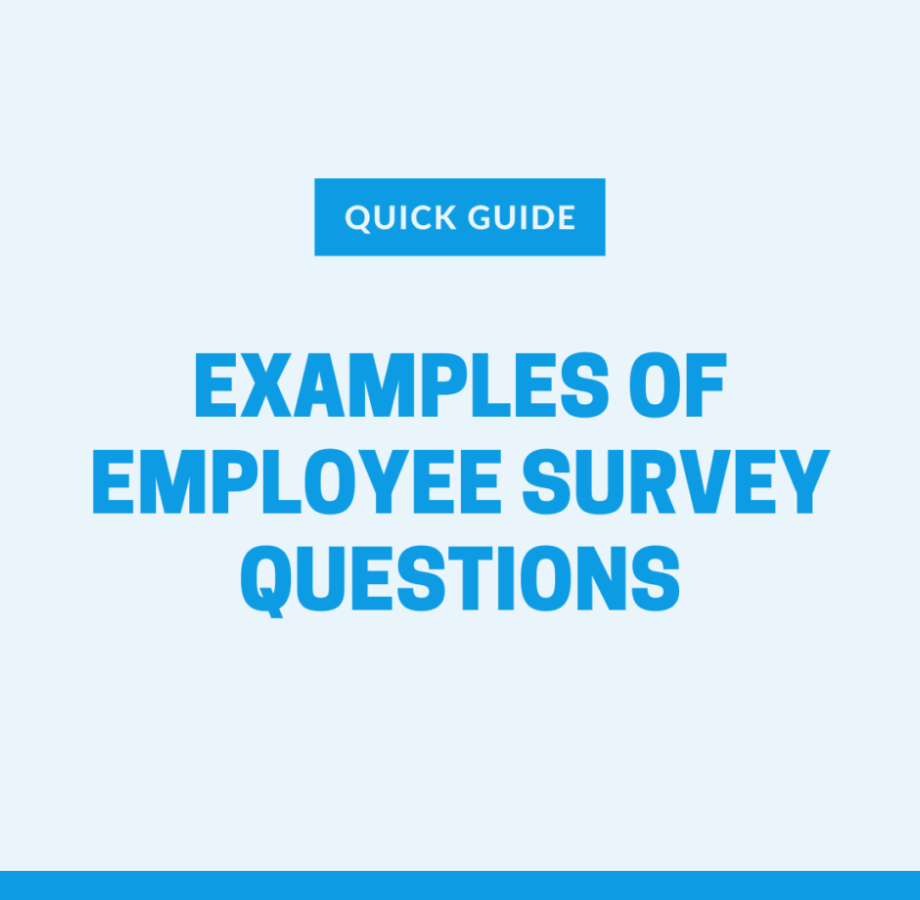
Whether you’re looking for a few interactive ideas to spice up your weekly newsletter or want to dig in for some real employee feedback, here’s a long (but nicely organized) list of survey questions that you can reference all year long!
Here’s a handy table of contents if you’d like to skip to the section you’re looking for!
- Employee satisfaction survey questions
- Employee feedback and/or opinion survey questions
- Employee wellness survey questions
- Employee pulse survey question examples
- Employee benefits survey questions
- Employee exit survey questions
- Employee morale survey questions
- Employee recognition survey questions
- New employee or employee onboarding survey questions
- Employee communication survey questions
- Employee diversity, equity, inclusion & belonging survey questions
- Employee retention survey questions
- Fun employee survey questions
- Employee survey questions about culture
- Employee survey questions about management
- Employee survey questions about work environment
Employee satisfaction or engagement survey question examples
Employee satisfaction surveys are often a great overall look at your team’s views, attitudes, and perceptions of their organization. We typically recommend running these about twice a year.
- On a scale of 1 to 10, how would you rate your work-life balance?
- On a scale of 1 to 10, how satisfied are you with your current job?
- On a scale of 1 to 10, how likely are you to recommend [company name] as an employer?
- On a scale of 1 to 10, how valued do you feel at work?
- What changes in [company name] would make you more satisfied with your job?
- What are the top 3 things you value the most about [company name]?
- Are there any other issues not mentioned in this survey you would like us to address?
- Have you ever recommended [company name] to someone? Why?
- Do you believe that there is an opportunity for individual career growth and development within the company?
- What changes have you seen since the last survey?
- The following series of questions are all to be answered on a scale of 1-5, 1 being strongly disagree, and 5 being strongly agree.
- My fellow workers treat me respectfully.
- I have all the resources I need to do my job successfully.
- My goals are clearly defined.
- My supervisors do a great job informing us about things that affect our work.
- At my job, I am able to use my skills and abilities.
- Management always demonstrates a commitment to quality.
- My team feels like they’re working cohesively and towards a common goal.
- I am involved in decision-making that affects my work.
- I would like to be more involved in decision-making that affects my work.
- I have opportunities to express myself.
- I have opportunities to recommend new ideas and solutions.
- I have a clear understanding of my career path and promotion plan.
- I am happy with my career path and promotion plan.
- I feel like my work is always recognized.
- I feel like I get rewarded for good work.
- Considering everything, I am satisfied with my job.
- I am satisfied with the opportunity I have to grow within the company.
- I feel like my work is valued.
You’ve done your employee engagement survey, and now it’s time to share the next steps and/or results with the rest of the company. Here are five templates to help you put together and communicate your results in a quick, concise way!
Employee feedback survey / employee opinion survey question examples
Employee feedback and opinion surveys are an incredible way to generate open, transparent communication about what’s currently going on in the company. It’s our go-to suggestion for when the leadership team is starting to feel a bit out of touch, and it’s a way to really hear a diversity of opinions from all facets of the organization. You don’t necessarily have to run all of these questions as one standalone survey, either; you could incorporate them as pulse surveys in an email, for example, or solicit the answers to one of them at a weekly all-hands meeting, for example. We would recommend anonymous responses to these surveys when possible, so your team isn’t afraid to hold back!
- What would you do differently if you were your manager?
- What is one thing you’d like senior leadership to know?
- Are you happy with the direction the company is headed?
- Do you have any suggestions to improve company/employee relations?
- Is there something your previous employer did that you think we should do?
- Do any of our processes seem inefficient to you? How can we fix them?
- Which company value should we consider changing, and why?
- Which company value resonates with you the most?
- What is the company’s greatest weakness?
- What is the company’s greatest strength?
- What’s one thing you would change about your team?
- What is the most repetitive part of your job, and do you have any suggestions for streamlining it?
- Are there things you don’t know about the company that you feel you should know?
- Are you proud of how we treat our customers?
Employee pulse survey question examples
Employee pulse surveys are single-question employee surveys that you can send out over email, post on your intranet, or put out over whatever digital internal comms channel you have available to you. They are fast, frequent, and give you a quick snapshot of employee views on specific topics. They’re typically done on a fixed measurement scale so it’s really easy to standardize responses and make the results both specific and easily measurable.
To be honest, you could run almost any question from all of the survey examples listed here as a pulse survey; just pull it out and incorporate it into your next company newsletter, for example!
- How was your day today?
- How would you identify your mood today?
- On a scale of 1-10, how would you rate your work-life balance?
- Do you agree with the company’s recent decision to ______? Why/why not?
- Do you find our employee newsletters useful?
- Do we send too many employee emails?
- Was our recent (meeting, event etc.) a good use of your time?
- Is there anyone who deserves special recognition for going above and beyond the call of duty?
It’s easy to add an employee pulse survey into any internal email with Workshop! Learn more about our drag-and-drop templates and interactive features (including surveys, GIFs, and more).
Employee wellness survey question examples
It’s difficult to get really solid quantitative data about the company’s wellness program (other than participation)…and, after all, wellness is truly subjective. That’s why we recommend gathering qualitative data via an open-ended employee wellness survey, a couple of times a year. This is the best way to really see if your initiatives are working, and solicit feedback from the team directly on how you can create an even bigger impact with your programs.
- Do you feel [our company] supports your wellbeing?
- What’s one thing [our company] can do to support your wellbeing?
- Do you think we should offer mental health services, like stress and anxiety management classes for our employees?
- Do you think our workplace promotes a physically healthy lifestyle?
- Do you feel it is important to have a well-defined corporate wellness program in an organization?
- What kind of wellness events would you like to attend?
- Do you get enough time to do your job well?
- Do you celebrate at work?
- Are you regularly stressed with deadlines and workloads?
- Do you usually take your work home?
- Do you often end up performing on weekends and holidays?
- Do you think you’re missing out on significant time together with your friends and family?
Employee benefits survey question examples
Once a year, it’s worthwhile to run a survey that specifically asks your employees about company benefits, and use the responses to potentially re-evaluate what the company is offering. You always want to make sure that your organization is staying competitive, and that your team isn’t looking to leave based on a lack of benefits…or, worse, little-to-no knowledge of what you provide.
- Do your employee benefits meet or exceed expectations?
- Do you feel that our company policies are thought out and fair?
- Are there any other benefits you think that the business could offer which would make working here more valuable?
- Rate each of our benefits in terms of importance to you.
- Are you satisfied with our professional development guidelines?
- How often have you used your health insurance?
- How often have you used the lunch benefit?
- Would you feel comfortable taking a vacation in the next six months?
- How likely are you to recommend the company to others based on the benefits plan?
- How do our benefits compare to other companies you have worked with?
- What elements of our work from home / flexible work policy do you like or dislike?
- Is there anything related to the benefits package you are still unclear about?
- Have you read or heard about any interesting initiatives related to benefits you would like to mention?
- The following series of questions are all to be answered on a scale of 1-5, 1 being strongly disagree, and 5 being strongly agree.
- I understand the benefits that our company offers.
- I understand the pension program.
- Accessing and using my benefits is a simple and straightforward process.
- The current series of benefits match what I expect from a company.
- All of the benefits were explained to me when I joined the company.
- I believe my benefits package is good by industry standards.
- My manager encourages me to use our health and wellness programs.
- I would like to know more about the compensation and benefits packages available to me.
- Please rate your satisfaction with the following employee benefits and policies on a scale of 1-5, 1 being very unsatisfied, and 5 being very satisfied.
- Accuracy of the job description
- Salary reviews
- Adequate information on promotion/new opportunities
- Health care benefits
- Vacation policy
- Other leaves of absence (sick leave, maternity/paternity, etc.)
- Retirement benefits
- Flexible work policy
- Free lunches (or other perks)
Employee exit survey question examples
Whenever an employee leaves, it’s a rare chance to get (mostly) unfiltered feedback that your company can use to grow and improve. We often recommend doing these in-person or via Zoom, rather than simply sending an email. However, organizations might want to automate something like this to send to former employees 2-3 weeks after they’ve exited the company, in an attempt to get more honest feedback (sometimes, employees hold back, even if it’s their last day).
- What are your main reasons for leaving?
- How well did you feel your skills were put to use?
- How was your relationship with your manager?
- How well were you compensated?
- What were the reasons why you started looking for a different job?
- Did you talk about your concerns before you decided to leave?
- Who have you talked to about your concerns? What was their response to your concern?
- What did the new company offer that made you accept the offer and leave?
- What would we have to change for you to decide to stay?
- What did you like the most about your job?What didn’t you like about your job?
- Did you have a clear idea about what was expected from you at this job?
- Did you feel like you had all the tools and resources to perform your job successfully?
Employee morale survey question examples
If you’re just looking to get a quick idea of how team morale is looking, these employee survey questions might do the trick! They’re designed to get a good overview of the emotional aspects of your team’s work, and can also help you connect with your employees on that level. (They’re truly great for one-on-ones, too!)
- Is there anything in your work world that’s causing frustration or delays?
- What inspires you to succeed every day?
- What is the most meaningful part of your job?
- When do you have the most fun at work?
- On a scale of 1-10, how hopeful are you?
- Do you feel secure in your role?
- On a scale of 1-10, how do you get along with your colleagues?
- How do you perceive the morale in the company?
- To what extent does workplace stress or pressure affect you outside of work?
- What could we do to improve your morale?
Employee recognition survey question examples
This is a survey that we often see run on a larger scale, once a year or so, though you can divvy up the questions for pulse surveys or one-on-ones. This survey is focused entirely on employee recognition: how employees like to receive it, when they like to receive it, and how it impacts the way they approach their work. (Here are 21 creative ideas for employee recognition, as well!)
Plus, it can be a lot of fun (particularly when you get into the details) to dig into as a manager; you’ll often be surprised by the responses, and it’s delightful to have a little additional context for ways your team would like to be appreciated.
- Do you feel valued and appreciated regularly by our organization?
- Is the recognition you get from your manager meaningful enough?
- Do you have any recommendations on how the business can recognize employees more effectively?
- What additional responsibilities would you like to take on for your project/team?
- What project are you most proud of completing in the past quarter?
- On a scale of one to 10, how appreciated do you feel [by your manager, coworkers, company]?
- What are some ways in which you believe the company can improve its employee recognition?
- How can teams and coworkers across geo-locations better show each other recognition?
- What’s an example of a recent time where you felt appreciated?
- What’s an example of a recent time where you felt under-appreciated?
- What accomplishment (by yourself, your team, or someone else within the organization) do you feel was overlooked or under-appreciated?
- What’s your favorite food, beverage, treat, or snack? (Make a list!)
- How do you spend your spare time?
- What is your favorite movie/book/sports team/TV show?
- What are a few of your favorite local restaurants?
- What new learning opportunities would you like to pursue?
- Rank the following rewards in the order that’s most meaningful to you:
- Monetary rewards (pay increases, bonuses)
- Small gifts (going for lunch, chocolates, snacks)
- Additional time off
- Stock options
- Leadership opportunities
- Words of encouragement/praise
- What type of recognition means the most to you?
- Personal written praise (such as notes and personal emails from management)
- Public written praise (such as company-wide emails and newsletter mentions)
- Personal verbal praise (such as a personal thank you from management)
- Public verbal praise (such as team or company meeting mentions)
New employee survey / employee onboarding survey question examples
One of the most common employee survey requests is for new hires! We recommend sending these out shortly after onboarding, but they’re also fantastic as individual questions within a new hire onboarding email sequence.
- Was there anything else we could have told you or done before you started your new job?
- What could we have done to make your first day better?
- Have you received sufficient training?
- Did you have enough check-ins with your manager during your first few weeks?
- On a scale of 1-10, how welcome do you feel here?
- What is something that has surprised you so far?
- Why did you accept this role?
- Is there anything that concerns you about your new role?
- What aspect of your new job excites you?
- What’s the biggest obstacle you’ve encountered so far?
- Is there anything that would help you feel more connected to the rest of your team?
- Are there any grey areas related to work policies and role requirements?
- How else would you like to add value to the company aside from just your current responsibilities?
- The following series of questions are all to be answered on a scale of 1-5, 1 being strongly disagree, and 5 being strongly agree.
- During the interview, I was able to communicate information about my skills, experience, and career goals.
- The job description explained during the recruitment process was accurate.
- I have received helpful organization history, product, and service information.
- I found the orientation program interesting and interactive.
- I feel well-equipped to do my job.
- I know who to go to for help.
- The onboarding time frame has been adequate.
- I think this is a great role for me.
- The organizational values of [company_name] align well with my own personal values.
- I understand how my role contributes to the organizational goals of [company_name].
- I am excited to be a part of this team.
- I understand how my work will be measured or evaluated.
- I have a clear understanding of my objectives and tasks and what I am expected to accomplish.
- My manager effectively communicates business goals and objectives to me.
- I understand how my role contributes to the organization’s goals.
- My onboarding has been successful.
Employee communication survey question examples
This survey will help you get a sense of what’s working (and what’s not) with your company’s current internal communications. We recommend sending out this survey every 6-12 months and all answers should be completely anonymous. You can also download these as a survey template in Google Sheets or Microsoft Excel here!
- How happy are you with the overall internal communication you currently receive?
- Amount of information
- Frequency of delivery
- Accuracy of content
- Relevance of material
- Style of presentation
- Please rate your level of satisfaction with our existing internal communication channels.
- Slack
- Company newsletter
- IntranetText messages
- Company all-hands meetings
- Department-level meetings
- One-on-one meetings with my manager
- Please rate your level of satisfaction with the communication from the following departments/teams/individuals.
- CEO
- Senior leadership
- My department head
- My manager
- My teammates
- Sales
- Marketing
- HR
- Product
- Engineering
- Finance
- Operations
- The following series of questions are all to be answered on a scale of 1-5, 1 being strongly disagree, and 5 being strongly agree.
- I can easily find the information I’m looking for.
- I know where to find the contact information for anyone in the company.
- Management communicates news and change effectively.
- I feel connected to the company’s mission and purpose.
- I know how the company is progressing toward its goals for the year.
- There are communication silos between departments.
- Remote team members feel connected to what’s happening inside the company.
- New employees have easy access to common requests (like time off or the company logo).
- I am overwhelmed by the amount of internal communication I receive.
- If I went on vacation for two weeks, I could quickly catch up on what I missed.
- If the information is urgent, a text or phone call is the best way to get ahold of me.
- If I need to share important information with the company, I know where to go.
- I would like to play a more active role in the company’s internal communications.
- I enjoy reading the company’s internal communications.
- What information do you wish you had more of?
- What information do you wish you had less of?
- What is a recent example where internal communications worked really well?
- What is a recent example where internal communications failed?
- What other suggestions do you have about improving our communication strategy going forward?
Employee diversity, equity, inclusion and belonging survey question examples
This survey should be run completely anonymously, especially since it’s common to ask pointed demographic questions about race, ethnicity, gender identity, etc. so that you can filter the data to look for any underrepresented, marginalized, or unengaged groups. As your company grows, you may not have a massive number of people in any minority group, so you want to make sure that you can’t “spot” a certain employee’s answers within this data. Your team should feel safe while filling out this survey to respond openly and honestly, without any fear of how the organization or their supervisor might respond.
- How diverse is your team?
- Does the organization provide equal growth opportunities to everyone?
- Are you comfortable talking about your ethnic background?
- How can we provide employees more freedom to voice their feelings?
- Are you able to discuss your concerns safely?
- Have you felt that you’ve ever been treated unfairly?
- How is our team doing with gender equality?
- Do you believe that the company gives you adequate resources as per your needs?
- What can we do to help us make better decisions?
- What measures could be taken to improve diversity and inclusion?
- Have you ever felt alienated, excluded, or discriminated against when trying to participate at work?
- Do you feel accepted and respected in the workplace?
- The following series of questions are all to be answered on a scale of 1-5, 1 being strongly disagree, and 5 being strongly agree.
- I can voice an opposing view or argument without fear.
- I am comfortable talking about my background and cultural experiences with my colleagues.
- Perspectives like mine are included in decision making
- The organization publicly communicates information about its diversity goals.
- Our organization is committed to diversity and inclusion.
- Our organization builds diverse teams.
- Racial, ethnic, and gender-based jokes are not tolerated at this firm.
- People of all cultures and backgrounds are valued here.
- If I had a concern about harassment or racism, I know where to lay my complaints.
- When I speak up, my opinion is valued.
Employee retention survey question examples
If you don’t want to wait to uncover surprises during your employee exit surveys, a retention survey might be the way to go! We recommend running this one about once a year, particularly if you’re starting to experience any kind of turnover issues.
- Do you think you will still be working here in two years?
- If you resigned tomorrow, why would that be?
- Are you paid enough?
- If you had to do it all over again, would you apply to this position? Why?
- What changes would make you sure about staying with [our company] for another year?
- Do you feel like you are reaching your full potential with this position? If not, what would make you feel that way?
- The following series of questions are all to be answered on a scale of 1-5, 1 being strongly disagree, and 5 being strongly agree.
- I feel like I am able to to reach my full potential at [our company].
- I feel comfortable working with my teammates.
- I feel like I always get feedback.
- I have a clear understanding about my career path and promotion plan.
- I am happy with my career path and promotion plan.
- I would apply for this job again.
- I like going to work.
- I feel like my feedback is valued.
- I feel like my work is valued.
- I can see myself working here in a year.
Fun employee survey question examples
Looking for icebreaker questions or quick pulse surveys to boost engagement with the company newsletter? Here are a few of our favorite fun employee survey questions. 🙂
- Who do you want to get to know better in the company?
- What song would be the soundtrack to your life?
- What should we order for lunch on Friday?
- How should we celebrate our next big milestone?
- If we did a Super Bowl commercial, which celebrity should we hire to star in it?
- Where is the next place you’d like to travel?
- What’s your biggest pet peeve at work?
- If you could add one thing to your current workspace, what would it be?
- When you were a kid, what did you want to be when you grew up?
- What TV show are you currently binge-watching?
- What’s your go-to karaoke song?
- What is the best piece of advice you’ve ever received?
- What is the most under-appreciated food of all time?
- What’s your Myers-Briggs personality type?
- What should we name the company newsletter?
- What’s something small that you’re really good at?
- What’s one recipe that you’d like to share with the entire company?
- What’s your most-hated household chore?
- What’s the first concert you ever went to?
Employee survey questions about culture
- What are 5-10 qualities that you think are must-haves for enriching and diversifying our team’s current culture?
- How would you describe our company culture to someone outside the organization?
- Do you think your organization has a culture that is open to risk-taking?
- How prominent is office politics in the workplace?
- Do you feel like we have too many meetings?
- Does our team spend enough time together, or not enough?
- If you won the lottery and decided to leave [our company], what would you miss most?
Employee survey questions about management
- Do you think our senior leaders are visible and reasonably accessible to employees?
- Does your manager communicate a clear picture of your team’s direction?
- How helpful is the feedback given by your manager?
- What are the things you would change if given a leadership opportunity in your team?
- Do you feel like the management team is transparent?
- Do you feel the leaders at our organization demonstrate integrity?
- What does your manager/supervisor do to keep your morale high?
- What comments, concerns, or questions do you have for your manager?
- How well does your manager respond to your mistakes, or mistakes on the team?
- If you have ever offered suggestions to management, how satisfied were you with the response?
- The following series of questions are all to be answered on a scale of 1-5, 1 being strongly disagree, and 5 being strongly agree.
- My manager is knowledgeable about my work.
- My manager takes time to listen to me.
- My manager gives me fair reviews.
- My manager has reasonable expectations of my work.
- My manager is willing to promote me.
- My manager trains me in whenever necessary.
- My manager makes sure I have sufficient training.
- I feel valued by my manager.
- I trust my colleagues and the people on my team.
- I enjoy working with my team.
- Management/leadership shows a genuine interest in my career goals.
Employee survey questions about work environment
- Do you feel remote work has been a positive experience?
- What has been the biggest challenge for you while working remotely?
- Do you think your organization has a culture that is open to risk-taking?
- Do you feel that the vibe of the workplace is positive and motivating?
- Do you have a comfortable space to work from home with good internet connectivity?
- Did you have at least one 4-hour block of uninterrupted time to work last week?
- What is your most productive time of day and environment?
- How many miles do you travel to/from work each day, and how long does it take?
Next steps:
Download our internal comms survey template: The first step of auditing and assessing your internal communications is to survey your employees and find out what is and isn’t working with your existing channels. It is a great place to start whether you’ve had a formal strategy in place all along or are putting together an internal comms plan for the first time. Check out the template here!
Add employee surveys directly into any internal email with a tool like Workshop. Learn more about Workshop and request a demo here!
